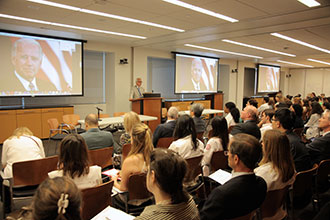
On June 29, 2016, Dr. Stieg hosted a meeting of world-class cancer experts to explore ways to accelerate progress in both research and care. The meeting at Weill Cornell Medicine was held in conjunction with a national summit in Washington, DC, hosted by Vice President Joe Biden and the “Cancer Moonshot” team. In addition to neuro-oncology experts from the Weill Cornell Medicine Brain and Spine Center, the New York panels included speakers from the Sandra and Edward Meyer Cancer Center at Weill Cornell Medicine and Ronald P. Stanton Clinical Cancer Program at NewYork-Presbyterian.
The Weill Cornell Medicine event included presentations and discussion from some of the top names in oncology here, including Dr. Lewis Cantley, Director of the Meyer Cancer Center; Dr. David Nanus, Chief of Hematology and Medical Oncology and Associate Director for Clinical Services at the Meyer Cancer Center; Dr. Silvia Formenti, Chair of Radiation Oncology and Associate Director of the Meyer Cancer Institute and Radiation Oncologist-in-Chief at NewYork-Presbyterian/Weill Cornell Medical Center. Speakers also included Himisha Beltran, MD, Assistant Professor of Medicine in Medicine and in Urology; pediatric neurosurgeon and neuro-oncology researcher Jeffrey Greenfield, MD, PhD; Dr. Susan Pannullo, Director of Neurosurgical Stereotactic Radiosurgery; Dr. Michael Kaplitt, MD, Vice Chair for Research in Neurological Surgery; Dr. Allyson Ocean, the Anne Moore M.D. Clinical Scholar in Hematology-Oncology; neurosurgeon Dr. Rohan Ramakrishna; Dr. Gail Roboz, Director of the Clinical and Translational Leukemia Program; Dr. Mark Souweidane, Vice Chair of Neurological Surgery and Director of Pediatric Neurosurgery; and Ching Tung, PhD, Professor of Chemistry in Radiology.
Topics ranged from the importance of getting more cancer patients enrolled in clinical trials to the ongoing frustration about the lack of research funding. The panels called for policy changes to facilitate more enrollment in clinical trials by any cancer patient anywhere – whether treated in a large urban hospital or a small rural community hospital, and for increased funding and streamlined paperwork on grant applications. The panels tackled the issues of acquiring and managing the “big data” now emerging from new genetic sequencing ability, and expressed frustration at road blocks that continue to delay progress, including matching a particular tumor to a promising drug based on its mutations, but then being unable to procure that drug for that patient.
Dr. Stieg and participants in the New York City Regional Summit will report back to the Biden national team, and plan to collaborate on a white paper to contribute to the national effort.
Photos by Ira Fox